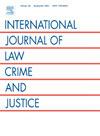女人的身体在激情和荣誉之间。为什么德国刑法需要在杀人罪的刑事部分整合一个性别特定的资格特征
IF 1.4
4区 社会学
Q3 CRIMINOLOGY & PENOLOGY
International Journal of Law Crime and Justice
Pub Date : 2025-09-17
DOI:10.1016/j.ijlcj.2025.100776
引用次数: 0
摘要
很长一段时间以来,甚至在《伊斯坦布尔公约》于2018年生效之后,关于德国杀害妇女的法律话语和实践都是围绕着对犯罪者的偏见以及德国主流文化与“移民未能融入社会”的非欧洲价值观的霸权二分法建立起来的。被认为是“有色人种”或“移民”的犯罪者被判犯有杀人罪,因为杀人是与荣誉有关的罪行,而作为犯罪者的“白人”(前)伴侣往往被判过失杀人罪,因为分离引起的压力等减轻因素。论文提到了德国刑事法院对“家庭和/或亲密伴侣杀人案”的管辖权,并提出了男权主义、厌女主义和种族主义的法律假设。它论述了将杀害妇女作为一种独特的刑事犯罪来执行《伊斯坦布尔公约》的要求和处理杀害妇女的更广泛的社会背景的重要性。由于德国法院努力确定杀害女性的具体性别、厌恶女性的动机,并在量刑时考虑这些动机,因此,在德国杀人罪刑事部分(《刑法》第211条)中引入具体女性和性别的资格特征,是确保更一致起诉的核心。本文章由计算机程序翻译,如有差异,请以英文原文为准。
Women's bodies between passion and honour. Why the German Criminal Code needs to integrate a gender-specific qualifying characteristic in the criminal section for homicide
The legal discourse and practice regarding the killing of women in Germany was for a long time – even after the Istanbul Convention took effect in 2018 – constructed around a biased perception of the perpetrator and the hegemonic dichotomy of German Leitkultur versus non-European values of ‘migrants failing to integrate’: Perpetrators perceived as ‘people of colour’ or ‘migrants’ were sentenced for homicide due to the killing as honour-related crime whereas ‘white’ (ex)partners as perpetrators were often given a sentence of manslaughter due to the mitigating factor of e.g. separation-induced stress.
The paper refers to German criminal courts' jurisdiction on ‘domestic and/or intimate partner homicide’ and carves out patriarchal, misogynist and racist legal assumptions. It addresses the importance of coining femicide as a distinct criminal offense to implement the requirements of the Istanbul Convention and tackle the broader societal context of femicide. As German courts struggle to identify gender-specific, misogynist motivations for femicide and to consider them in sentencing, the introduction of a woman- and gender-specific qualifying characteristic in the German criminal section for homicide (§ 211 StGB) is core to ensure more consistent prosecution.
求助全文
通过发布文献求助,成功后即可免费获取论文全文。
去求助
来源期刊
CiteScore
2.70
自引率
0.00%
发文量
25
审稿时长
47 days
期刊介绍:
The International Journal of Law, Crime and Justice is an international and fully peer reviewed journal which welcomes high quality, theoretically informed papers on a wide range of fields linked to criminological research and analysis. It invites submissions relating to: Studies of crime and interpretations of forms and dimensions of criminality; Analyses of criminological debates and contested theoretical frameworks of criminological analysis; Research and analysis of criminal justice and penal policy and practices; Research and analysis of policing policies and policing forms and practices. We particularly welcome submissions relating to more recent and emerging areas of criminological enquiry including cyber-enabled crime, fraud-related crime, terrorism and hate crime.

 求助内容:
求助内容: 应助结果提醒方式:
应助结果提醒方式:


